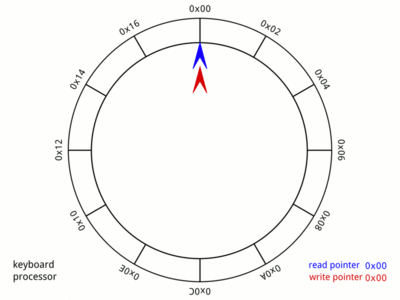
In this homework, you will implement a naive thread pool. A thread pool is a very common design, aims to reuse threads to avoid the overhead of creating and destroying threads.
Download the starter code here.
Before start working with pthread, we must first learn a data structure named ringbuffer.
A ringbuffer is a circular queue with a fixed maximum size. See ringbuffer.h

ringbuffer_t *ringbuffer_create(size_t size);size and return the pointer of ringbuffer created.void ringbuffer_destroy(ringbuffer_t *ringbuffer);ringbuffer. Release all the memory allocated.
bool ringbuffer_is_empty(ringbuffer_t *ringbuffer);true if the ringbuffer ringbuffer is empty, otherwise return false.
bool ringbuffer_is_full(ringbuffer_t *ringbuffer);true if the ringbuffer ringbuffer is full, otherwise return false.
bool ringbuffer_push(ringbuffer_t *ringbuffer, threadpool_task_t value);value into the ringbuffer ringbuffer.true if the push is successful, otherwise return false.
bool ringbuffer_pop(ringbuffer_t *ringbuffer, threadpool_task_t *value);ringbuffer and store it in value.true if the operation is successful, otherwise return false.
Now we are ready to implement the threadpool. See threadpool.h
We harness ringbuffer to store tasks added with threadpool_add_task.
Instead of directly initiate task functions, which cause thread creation overhead for every task, we run a worker function (static void *threadpool_thread(void *threadpool);) as a
thread,
it remains idle until destroyed by signals or fetch a new task.
threadpool_t *threadpool_create(size_t thread_count, size_t queue_size, bool sync);thread_count threads and a ringbuffer with size queue_size.bool threadpool_destroy(threadpool_t *threadpool);threadpool. Release all the memory allocated.sync == true when the threadpool was created, wait until all tasks are finished.true if the threadpool is successfully destroyed, otherwise return false.
bool threadpool_add_task(threadpool_t *pool, void (*func)(void *), void *args);func and argument args into the threadpool pool.true if the task is successfully added, otherwise return false.false if the threadpool is full.
Simply run make submit, and submit the tarball named hw6_threadpool.tar generated to autolab.

They might be a little intimidating, but rather helpful for debugging!
One possible solution:
ringbuffer.c | 18 ++++--------------
threadpool.c | 42 +++++++++++++-----------------------------
2 files changed, 17 insertions(+), 43 deletions(-)
Note that there are lots of TODOs in the code, which is the cause of most of the deletion.
You can generate your own statistics by running diff -uN template answer | diffstat, where template and answer are the directories of template given and your answer respectively.